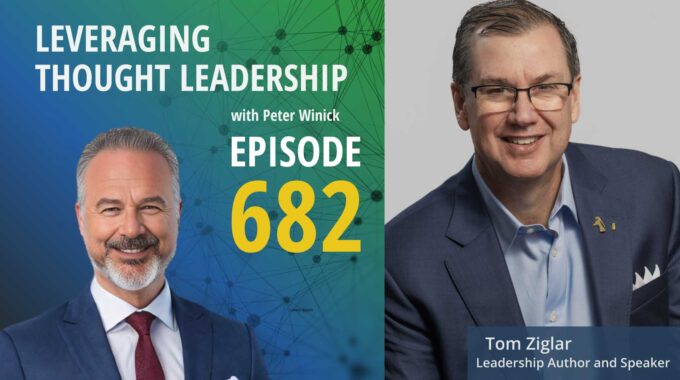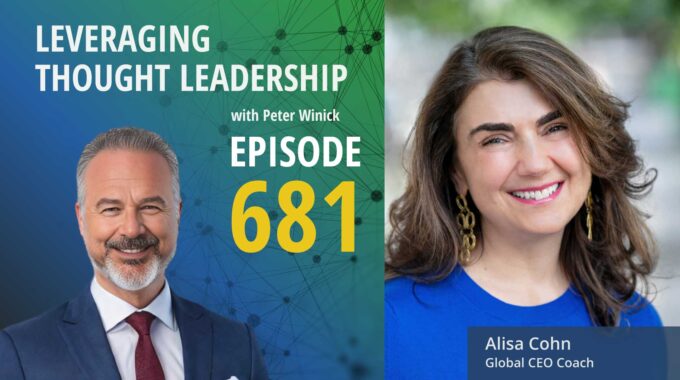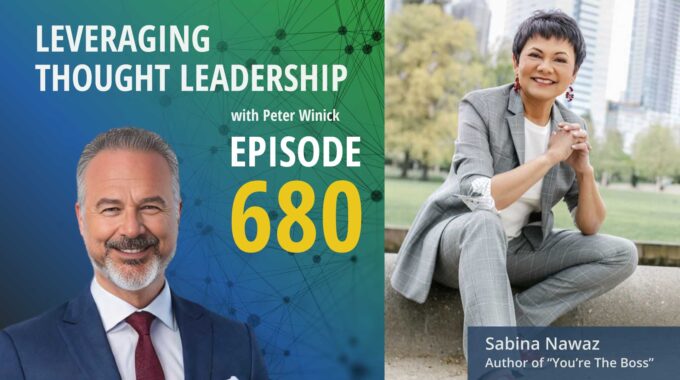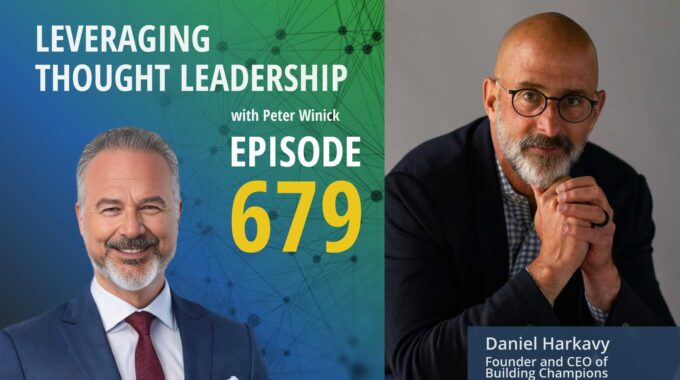How AI, Programs, and Trust Turn Ideas into a Life-Changing Business This episode explores how…
Strengthening a Brand with a Book | Michael Tuggle
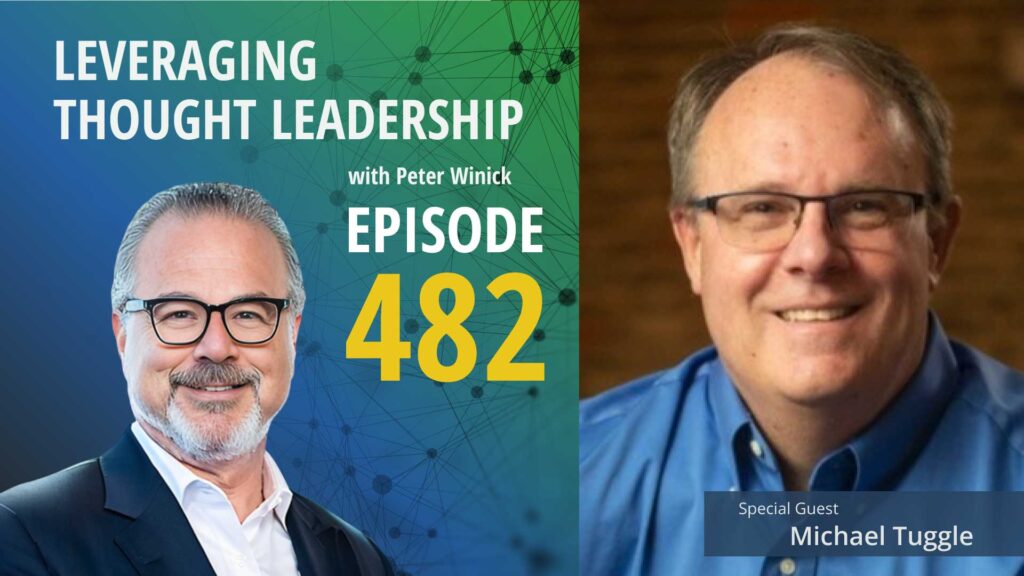
How culture and brand work together.
An interview with Michael Tuggle about writing a book that enables challenger brands to break out.
If you had nearly 30 years of experience building brands like American Airlines and Pepsi,
wouldn’t you want to share all the great insights you’d developed?
Our guest today is Michael Tuggle, the President of Tuggle Creative Inc, Chief Creative Officer of Something Else Strategies, and co-author of The Voice Of The Underdog: How Challenger Brands Create Distinction By Thinking Culture First.
After having worked with Mike Sullivan (President and CEO of LOOMIS), bringing a strategic advantage to challenger brands for over 10 years, Michael knew that it was time to share his insights with others. Michael discusses what it was like working with his partner for more than 6 months of writing, and another 12 months of editing, in order to bring their book to life.
We learn the process used to create the architecture of the book, how the chapters were decided and ordered, and their process: writing notes before letting the creative impulse take over. He also discusses the case studies and stories they included, to make the information more accessible.
Spending 18 months putting a book together can come with a huge opportunity cost. Michael explains how self-publishing was only one part of their business model. While most will buy the book and use the information to the best of their ability, some will seek a deeper dive into the content, and will hire him to bring that content to their teams and organizations in scalable ways.
Our conversation has great advice for both challenger’s brands and would be authors.
Three Key Takeaways:
- Writing a business book is an efficient way to drive business and build credibility.
- The time cost of writing a book can be large, but if you can pick up a handful of new clients it will be well worth the investment.
- When writing a book don’t edit yourself as you go. Allow the insights to come out then edit it later.
If you need a strategy to bring your thought leadership to market, Thought Leadership Leverage can assist you! Contact us for more information. In addition, we can help you implement marketing, research, and sales. Let us help you so you can devote yourself to what you do best.

Transcript
Peter Winick And welcome, welcome, welcome. This is Peter Winick. I’m the founder and CEO of Thought Leadership Leverage and you’re joining us today on the podcast, which is Leveraging Thought Leadership. Today, my guest is Michael Tuggle. He brings more than 29 years of experience building brands from companies like American Airlines, Pepsi, Texas, Dairy Queen, Papa John’s and more. He coauthored his first book with his longtime friend and colleague Mike Sullivan, who’s the president of Loomis, which was called The Voice of the Underdog. How Challenger Brands Create Distinction by Thinking Culture First. And he has a long and pretty impressive past that you could look up, but I’d rather just start talking with him. So, Michael, welcome aboard. Thanks for coming on today.
Michael Tuggle Thanks, Peter. Thanks for having me.
Peter Winick So you’ve got this long, impressive career, primarily in the advertising space by building brands and all those sort of things. And then one day you either woke up or were coerced into writing a book. Why? Why or how did that happen? And why are we going to agree to do something so great?
Michael Tuggle You know, it’s funny. Mike and I were Mike Sullivan and I was the president over at Loomis. I was at Loomis for 15 years. And Mike and I have been colleagues in a number of agencies and have been friends for almost 30 years now. And it’s one of those things where we were building the agency. Loomis had adopted this challenge of brand positioning to where we wanted to help brands, you know, that were there fighting the category leaders. And we were living it. And we talked for ten years about, you know what? We really should write a book about it. We’re not the first to write a book about it.
Peter Winick Now, of course.
Michael Tuggle Our positioning came out of Eat Big Fish, out of London.
Peter Winick But yes.
Michael Tuggle But we just we talked about it for ten years. And like, you know what? We should just finally do it. And we said we finally did and have enjoyed it, you know, since.
Peter Winick Yeah, I’m quite familiar with that kind of thing, because Big Fish at a time was a client of ours. But give me a sense of what that process was like. Was it did it take more time than you thought? Less what you got out of it? What was the give us the experience of not just deciding to commit to writing the book, but writing it and what came out of that?
Michael Tuggle Yeah. So you know what? It’s sort of the eat the elephant one bite at a time kind of thing. It was, you know, we work together and put it in the outline together about what we actually wanted to say. I mean, part of it, if it once you read the book, part of it is about challenge of branding. But really the other back half of it is all about culture from the day we started the agency. I mean, literally the day we started it, we sat in a conference room like, okay, we want to take all the good things that we can take away from our past experience, and we all leave all the toxic crap at the door and not, you know, and really be mindful and intentional about the culture that we build. And now you don’t just do that overnight. But we did it over the course of 15 years. And so the book was sort of an amalgam of that. So we set out an outline about what we wanted to write and then he and I would trade off some we wrote. I wrote about half of it, Mike wrote about half of it. But our styles are very similar. And so we would write and then hand it to the other person and they would, you know, look at it. And, and John wanted the chapters built. And then we had a book about took about six months to write it and probably another year to edit it and, and to get it in book form.
Peter Winick But and what are the benefits that you and the organizations that you work with received with any from getting that book out there? What doors have been opened, what surprising things have happened?
Michael Tuggle You know, we’ve been very I mean, like every author, I think we both have been very pleased and surprised a little maybe at the reception. I mean, everybody who’s read it has been very positive and very, you know, not just our moms, which was nice, but everybody’s been, you know, pretty, pretty receptive. And they’ve said that they got a lot out of it and they felt like we tried to keep it really light. We did not want it to be an academic book. Sure. We tried to, you know, accrue a lot of stories, case studies, that kind of thing. And the entire intention of the book, frankly, was to drive business. It was really to lend credibility.
Peter Winick To stay there then. So, I get that. So, you know, if we’re going to make if we look at a book honestly. Right. And I think a lot of people just either don’t do this either out of naivete or they just don’t do it and say, okay, we have choices to make in the next year, I’m going to write a book that’s going to take whatever, 30, 40% of my time and there’s opportunity cost. You can assign a number to that and it’s going to take some dollars marketing support, editorial support, etc. If I’m making an investment of X, pick a number, what is an appropriate return on that investment? And I think people, when they get into book mode, they get sucked into this, this vortex and all their business savvy and acumen goes out the window. So, if you were to think about it without necessarily getting to the specifics, but you know, the range of the actual cost, opportunity cost and. Hard dollars. All that versus the outcomes. Are you happy with it? Does it have more to go?
Michael Tuggle Yeah, I think we’re pleased with it. I mean, it was there’s definitely an opportunity cost for sure. I mean, it takes a lot of time. I mean a lot of time, but it depends on what your intention is, too. Like I said, this is not a vanity project for us. It was not a hey, we have, you know, fun experiences in the business and hey, we want to have our names on a book. It was and it was never about getting rich or being a best selling author. It was really about driving business to the agency, you know, adding credibility to what we were doing as a challenger agency, but also, you know, giving kind of a roadmap just.
Peter Winick To stay there for a minute. Right. So, if we think about it, because I like the level of specificity you’re getting into now, so you’re not the only Challenger agency out there, Right. So if people are looking for a hey, people might be looking for an agency, a subset of those people might be looking for a challenger agency, and then they’re going to look at you and your competitors, Right? So number one is if we know what our average flying value is and I’m sure that you do, you could look at this and say, well, actually it’s a pretty big cost, but all we would need to do is secure whatever one net new client or three net new projects open for two years. And this is a no brainer. And then I think what people also don’t realize when it comes to writing a book is even though the publishing universe thinks in terms of a three month or a six month cycle, you know, a book typically has no pun intended, you know, a 5 to 7 year shelf life when it is viable in that regard. So how what’s your experience been on that side?
Michael Tuggle You know, when you self-publish, which I mean, there are, you know, 10,000 titles a month or whatever it is that are published, Right? There’s a lot out there. Art says it’s been it’s been more this and thankfully, like being on your show. You know we’re we are pushing a little bit more, you know, in terms of getting more exposure. Now, when we published, it was more self push. You know, we were sending it out. We were sharing it with people that we knew and that kind of thing. But to your point, it is, you know, if you can get one or two clients, you know, it’s certainly worth the effort.
Peter Winick If you’re enjoying this episode of Thought Leadership Leverage. Please make sure to subscribe. If you’d like to help spread the word about our podcast, please leave a five-star review at ratethispodcast.com/ltl and share it with your friends. We’re available on Apple Podcasts and on all major listening apps as well as at ThoughtLeadershipLeverage.com/podcasts.
Peter Winick Well, you mentioned self-publishing, and I think that to me self-publishing is just a business model, right? It is one, you know, there are many ways to publish. You can go traditional. In an instance like yours, there’s probably a lack of alignment between what a publisher would want is an outcome for the book. They want to sell a lot of copies and you’re going, Hey, I’d be happy if over five years we got three new clients, right? And then there’s different levels of self-publishing from copy shops all the way on to those that give you various services from editorial marketing, etc.. So that’s a whole other ball of wax. But, you know, on the self-publishing side, you have the advantage of speed, of control, of ownership of the intellectual property, not being accountable. And I think the reality I’d love to hear your thoughts is that, you know, unless you’re hardcore in the publishing business, most people don’t know the difference as long as it’s a quality product. If you have great ideas to share, you know I’m going to consume those ideas and go, Wow, that was awesome and not go, Oh, poo poo, he self-published. He’s probably not as smart as, you know, someone that didn’t write.
Michael Tuggle You know, it’s not like we were averse to, you know, a big publisher publishing a book in our book. We were just probably impatient in that we were not we didn’t want to go through however long that process is of finding a publisher. And, you know, we were ready to go. We wrote the book. We had a very intentional reason for doing so, and so we were ready to go, so we published it ourselves. Now, to your point, we made sure that the product looked the part, right? We had it our rights, our directors, obviously at the agency, Tina Tackett, who’s our executive creative director, designed the coverages on the book, laid it all out. I mean, it looks nice. It looks like anything you’d see professionally done. You’ve seen books that were self-published that you can it looks like it was cranked out as in a garage. This doesn’t help.
Peter Winick What you’re seeing. You’re seeing I mean, quite frankly, there is no excuse for that right now. I mean, you’re seeing less and less and less of that. I would say 15 years ago, if somebody threw five books out on the table and say, pick out the two that are self-published, you could do it. Yeah, I would say unless it’s really awful or low quality or whatever, it’s almost impossible to discern from a quality perspective A versus B versus you agreed.
Michael Tuggle And we were just you know, we wanted to get the ideas out, you know, And so part of part of the plan as well was the book. You know, it talks a lot about branding and culture. But we also we also wanted to include literally a blueprint, like if you were going to start from you wanted to embrace both of these ideas, culture especially, but you didn’t know where to start. It wasn’t just a 50,000 foot level here. It’s just a great idea. Conceptually, we wanted to literally we have a step-by-step blueprint to do that. And so when you.
Peter Winick Say go with the blueprint for a moment, because one of the things that I’ve seen that are interesting is I agree with you that that’s a that is a better way to go about it. Like, here’s exactly what you need to do and here’s how you do it, etc., etc., etc.. There are some folks that would push back and say, Oh jeez, but if I tell them what to do, why would they hire me? And my response to that is always, that’s not the group that would ever hire you anyway, right? Like the more that you could show them. Now there’s a subset of readers that say they can’t afford you. They’re on the market for an agency, whatever, whatever, whatever they’re going, they’re going to do that magically. And that leads to good accolades and positive vibes and all that sort of other stuff. But most folks look at that and go, okay, they have a methodology, they have a process. We need to work. I know exactly what it’s going to be like to work with these folks. They have a challenge mindset, right? And this is their methodology and process. So by the time they come into the sales cycle, they’re halfway home.
Michael Tuggle Yeah, I think there were two great things that came out of actually, you know, do it writing the book as opposed to just talking about it. Right. So the first was, you know, we wrote the book based on what we’ve been doing for years. It’s not like we met, you know, suddenly did the. Right. But the first thing was we literally had the blueprint for how do you create a great culture. But the other thing we did, we sort of codified this process of if you are a Challenger brand and you’re starting off with, I did okay, I am a Challenger brand and I don’t know what to do next. We literally have codified a document now to where we can literally take you through an entire Challenger process to where when you get to the back end, you’re going to know who you are, how ready you are to go, to go to battle and how to do it, how to do it, you know, and where.
Peter Winick You might need help along the way. Right or right? Exactly right.
Michael Tuggle Yeah, Cool.
Peter Winick So if someone was out there now, like in any sort of professional services, let’s just stay in that space for a while and they’re contemplating going down the path that you went down. What advice, what insights would you give them to increase the odds of success, maximize the probability of having a win, investing their time and energy about?
Michael Tuggle Sure. I would say start out with a great plan. I mean, obviously start out with the architecture of what it is that you want to say. Don’t just start writing. I mean, you really have a plan. Ever have your chapters laid out? I would you know, we laid out the chapters and then we laid in a bunch of notes on each chapter. Not writing, but just what do we want to include? And then, you know, let the writing process take over. The other thing is know going in. It’s a long process, and the best thing I can say is give it, you know, 500 words a day. You know, 500 words a day is not that much, but 500 words a day. Over the course of a year, 180,000 words. That’s a 500-page book. So if you can just stay at it and do a little bit at a time, there’s this feel that like I got to sit down and write a chapter today. I’ve got to, you know, knock out four chapters this weekend. Number one, that’s hard to do. Number two, I think you miss things along the way, doing it a little bit of time. Like you’ll have thoughts in the middle of a sleep, in the middle of the.
Peter Winick Day, scribble down a note.
Michael Tuggle Yeah, that and it’s fine.
Peter Winick With that 500 words. You know, 500 words is an average length blog post, right? So, you know, there’s I think the other problem is that, you know, so let’s say you decide because we’ve seen people go down this road, Right. I’m going to block up three weeks and go up to the cabin. It’s hard to schedule an insight. It is. Yes. You get up there and it’s like, okay, now what? Chirp, chirp. What do I do? But you can force yourself through the 500. Maybe there’s times where, you know, you get an extra burst and you give it an extra hour or so. But I would argue probably knock out 500 words in 115 minutes, half hour, depending.
Michael Tuggle Oh, well, it depends. I mean, it depends on who the writer is. Sure. I would say no more than a couple of hours. I mean, have it like it is a great 500 words. I mean, you can knock out 500 words stream of consciousness pretty quick, but if you really want.
Peter Winick It to be polished. Yeah.
Michael Tuggle And that’s the other thing I would say too, is don’t edit yourself along the way. Get it out. You know, that’s a Stephen King rule. Just get it out of your head and then edit later.
Peter Winick Well, that’s a great point because there’s a process where you just want to extract the ideas and then there’s a time and actually not a time, but other folks that can help you polish it up grammatically, or is that the best way to get that thought up? But just letting it sort of go somewhere between stream of consciousness and a punctuated sentence sweet spot.
Michael Tuggle And I would say to based on what you said with the blog, don’t underestimate things that you’ve already written. I mean, by the time we sat down to write this book, we had probably written 250 blogs, many of which were about challenge branding, many of which were about culture. It’s your intellectual property. You wrote it, right.
Peter Winick So I love that because most people think starting to write a book is literally a blank page. But what you’re saying is I would push on that and say, actually take inventory. What are the blogs? I’ve read the speeches, I write the decks, I’ve created, the interviews I’ve done, get transcripts done and say, well, you know what? I might be three 40% of the way there. Or, you know, you also have some data to say for some reason, these 20 blogs people really, really resonated with these ten crickets. So what was it about these that that resonated with folks that I should expand on in the book? Because I look at those things as just sort of micro experiments that give you insight.
Michael Tuggle Sure. And you know what? And those 20 blogs that resonated that you already got traction with. We’ll see if they hang together conceptually, but those could be your 20 chapter starters. I mean, you may have you may have a book already kind of in the background, like ready to Roll.
Peter Winick Yeah, well, it’s just been a lot of fun. Michael, I appreciate your time. I appreciate you starting your journey with us. Any parting words of wisdom to those out there about to embark on a similar journey?
Michael Tuggle You know what? It’s just the whole thing is worth it. I mean, it really is. It’s we were very thankful to get to the end of it, you know, after the work. But yeah, something that, you know, like you said, it never kind of goes away. You. It always is there. You know, we’re proud to have done it and hope that people get something from it.
Peter Winick Great. Thank you so much.
Michael Tuggle Appreciate it. Peter, appreciate it.
Peter Winick To learn more about Thought Leadership Leverage, please visit our website at ThoughtLeadershipLeverage.com to reach me directly. Feel free to email me at Peter at ThoughtLeadershipLeverage.com and please subscribe to Leveraging Thought Leadership on iTunes or your favorite podcast app to get your weekly episode automatically.


